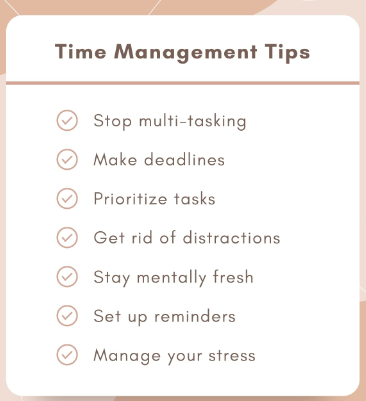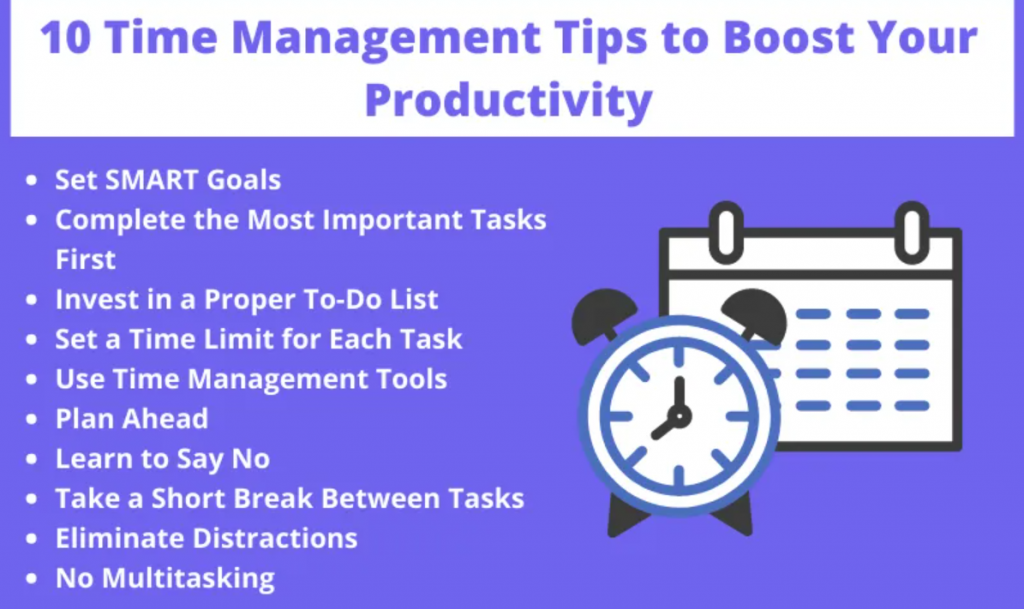Engineering has always been a field of innovation and evolution, offering exciting opportunities for those who choose it as a career path. As a fresh graduate or a college student,…

What is Time Management and How to Manage Time Effectively
Time management is the ability to plan and organize your time effectively. It is a necessary skill for achievement in both college and the workplace. You can do more in less time when you have adequate time management techniques, which can open up time for other pursuits. Undergraduates and freshers can substantially benefit from learning effective time management tips as they navigate their academic and professional life. Learning time management skills are essential for success when there are many tasks, deadlines, and obligations.
This article will provide you with some time management tips that will work for you. Whether you are a college student, a fresher looking for a job, or a working professional, these tips can help you to improve your time management skills and get more done.
What is Time Management?
To maximize productivity, efficiency, and effectiveness, time management is the process of organizing, planning, and regulating how you divide your time among particular tasks, activities, or goals. It entails making deliberate decisions about what to prioritize when to complete activities, and how to manage your time to get the results you want.
Increased productivity, lower stress levels, a better work-life balance, better decision-making, and the capacity to accomplish personal and professional goals more quickly are just a few advantages of effective time management. Making the most of one’s limited time resources is a skill that is useful in both personal and professional circumstances.
Importance of Time Management
In both personal and professional situations, time management is of utmost significance. Making the most of one’s limited time resources allows one to be more productive, less stressed, and more well-rounded overall. By setting priorities, establishing clear goals, and managing their time effectively, people may make sure that essential and urgent issues are taken care of right away. Additionally, it encourages greater organization, saving people from last-minute hurries, missing deadlines, and a sense of overwhelming turmoil.

Strong time management skills may also help you make better decisions, achieve a better work-life balance, and have more opportunities for both personal and professional development. Time management essentially gives people the capacity to take charge of their time, accomplish their objectives, and live more fulfilled lives.
Top 10 Time Management Skills
Effective time management requires a combination of skills, strategies, and habits. Here are the top 10 time management skills that can help you make the most of your time:
- Goal-setting: Clearly state both your short- and long-term goals. Knowing what you want to do can help you set priorities and manage your time well.
- Prioritization: List tasks and rank them according to significance and urgency. To divide activities into four quadrants – urgent and important, important but not urgent, urgent but not important, and neither urgent nor important, use strategies like the Eisenhower Matrix.
- Planning and Time Management: Make a daily, weekly, or monthly plan outlining the times and methods you will use to complete particular activities. To keep organized, use conventional planners or digital tools.
- Time Blocking: Set aside time during which you will only be concentrating on certain projects or categories of work. Concentration is improved and distractions are reduced as a result.
- Task Breakdown: Divide more complex jobs or projects into smaller, more manageable chunks. This helps you advance gradually and reduces the feeling of overwhelming complexity.
- Delegation: Understand when to assign responsibilities to someone who is more qualified for the job or when you have too much on your plate. Your time is freed up for more important tasks when you effectively delegate.
- Setting Deadlines: Assign tasks and project deadlines that are reasonable. Setting deadlines for yourself helps increase accountability and a sense of urgency.
- Eliminating Time Wasters: Recognise and cut back on activities like excessive social media usage, ineffective meetings, and multitasking that take up your time without providing any value.
- Effective Communication: Be upfront with coworkers, team members, and managers about your goals and time limits. This lessens last-minute demands on your time and manages expectations.
- Flexibility: Be ready to adapt your plans and priorities as necessary in response to unforeseen circumstances. Your capacity to adapt guarantees that you can continue on your course despite setbacks.
How to Manage Time?
Learning how to manage time effectively is crucial for boosting productivity and achieving personal and professional goals. To master how to manage time, start by setting clear priorities and breaking tasks into manageable chunks. Create a schedule or to-do list to stay organized and track deadlines. Avoid multitasking, as it can reduce focus and efficiency. Regularly evaluate your progress and adjust your plan if needed.
Understanding how to manage time also involves taking breaks and ensuring a balance between work and personal life to prevent burnout and maintain long-term productivity.
Time Management Skills for Success
Developing strong time management skills is essential for effective planning and organization. Here are some key time management tips to cultivate:
- Prioritization: Acquire the ability to recognize and rank tasks according to their priority and completion dates. To guarantee that they are completed on time, concentrate on your top priorities.
- Setting SMART objectives: To keep motivated and engaged, set specific, measurable, attainable, relevant, and time-bound (SMART) objectives. Larger goals should be divided into more minor, more feasible actions.
- Task Delegation: To lessen your workload, assign jobs to others when it is practical. This enables you to concentrate on activities that call for your knowledge and attention.
- Time Blocking: Set up specified time blocks for certain chores and activities. This keeps you focused and organized so that you can complete each work without being overburdened.
Significance of Time Management
Time management is a crucial skill that impacts nearly every aspect of life, from personal growth and productivity to achieving long-term goals. It is especially valuable in academic and professional settings, where competing priorities and deadlines require careful planning and efficient use of time.
Here are some key reasons why time management is so significant:
- Enhanced Productivity and Efficiency: Time management allows individuals to accomplish more within a limited period. By prioritizing tasks and allocating specific time blocks for each, people can work with greater focus and avoid unnecessary distractions. This increases productivity and makes it easier to meet deadlines without feeling rushed.
- Reduced Stress and Anxiety: When tasks are planned out and organized, it can alleviate the stress that often accompanies last-minute work or unexpected demands. Knowing what needs to be done and when it reduces anxiety, creating a sense of control and balance in one’s workload.
- Improved Decision-Making: With effective time management, there’s more time to make well-thought-out decisions. Rushed decisions can lead to errors or missed opportunities, but by managing time effectively, individuals can approach decisions with a clearer mind and ample preparation.
- Better Work-Life Balance: Time management helps in setting boundaries and allocating time for both work and personal life. By organizing tasks efficiently, people can free up time for relaxation, hobbies, family, and friends, leading to a healthier and more satisfying lifestyle.
- Achievement of Long-Term Goals: Long-term goals, whether academic, career-related, or personal, require consistent effort over time. Time management skills enable people to break down large goals into smaller tasks and work on them progressively, increasing the likelihood of achieving them.
- Greater Focus and Concentration: When time is managed effectively, people can focus on one task at a time rather than juggling multiple priorities. This focus leads to higher quality work, as attention is directed fully towards one activity without the distraction of an overwhelming to-do list.
- Building Discipline and Accountability: Time management fosters self-discipline as it involves sticking to a schedule and following through on commitments. Over time, this discipline strengthens accountability, helping individuals maintain consistency and reliability in both personal and professional realms.
- Increased Opportunities and Career Growth: Effective time management often leads to greater career success, as professionals who are reliable and efficient are more likely to be trusted with important tasks and promoted to higher positions. It opens doors to new responsibilities, learning opportunities, and career advancements.
In summary, time management is essential because it enables individuals to make the most of their available time, enhance their productivity, maintain a balanced life, and ultimately work towards their personal and professional goals with greater focus and control.
Best Time Management Tips for Students
There are many demands that consume college students’ time. They are involved in academic work, extracurricular pursuits, and social life. While juggling all of these obligations can be challenging, effective time management is essential for success.
Here are some time management tips for college students:

- Set Clear Goals: Define your academic and personal goals. Knowing what you want to achieve will guide your time management efforts.
- Create a Study Schedule: Develop a weekly study schedule that outlines when you will work on specific subjects or assignments. Allocate more time to challenging courses.
- Use a Planner or Calendar: Keep a digital or physical planner to track important dates, deadlines, and events. This helps you stay organized and avoid last-minute surprises.
- Prioritize Tasks: Use the Eisenhower Matrix to categorize tasks based on their importance and urgency. Focus on completing high-priority assignments first.
- Break Down Tasks: Divide larger projects or assignments into smaller, manageable steps. This makes it less overwhelming and easier to track progress.
- Avoid Procrastination: Identify your procrastination triggers and take steps to minimize them. Use techniques like the Pomodoro Technique (25 minutes of focused work followed by a 5-minute break) to maintain productivity.
Time Management Tips for Working Professionals
Time management is critical for working professionals to maintain productivity, reduce stress, and achieve a healthy work-life balance. Here are some time management skills tailored for professionals in the workplace:

- Set Clear Goals. Define your career and personal goals. Knowing your objectives will guide your time management efforts.
- Prioritize Tasks. Use the Eisenhower Matrix to categorize tasks based on their importance and urgency. Focus on high-priority, high-impact tasks first.
- Plan Your Day. Create a daily or weekly schedule that outlines your work tasks, meetings, and deadlines. Allocate time blocks for specific activities.
- Use a Digital Calendar. Maintain an organized calendar using digital tools like Google Calendar or Microsoft Outlook. Set reminders for important events and deadlines.
- Eliminate Time Wasters. Identify common workplace distractions and take steps to minimize them, such as turning off non-essential notifications or blocking distracting websites.
- Batch Similar Tasks. Group similar tasks together and complete them in one go. This reduces context switching and increases efficiency.
- Set Realistic Deadlines. Be mindful of your workload and set achievable deadlines. Avoid overcommitting and creating unnecessary stress.
- Learn to Say No. Politely decline additional tasks or commitments that don’t align with your priorities or capacity. Don’t overextend yourself.
How Can You Manage Your Time?
Knowing how you can manage your time effectively is essential for achieving your goals and staying productive. To improve how you can manage your time, start by setting clear priorities and creating a to-do list to organize tasks. Break larger projects into smaller, manageable steps to avoid feeling overwhelmed. Learn to say no to distractions and focus on one task at a time.
Regularly assess your progress to ensure you’re staying on track. By understanding how you can manage your time, you’ll create a more balanced schedule that helps you meet deadlines and reduces stress.
Both freshers and recent graduates seeking work must learn time management skills. You may increase productivity and lower stress by using efficient time management strategies like work delegation, goal-setting, and prioritization. Remember to plan ahead, establish reasonable deadlines, divide tasks into manageable pieces, and refrain from procrastinating.
Related Reads:
- Common Behavioural Interview Questions for Freshers
- A Fresher’s Guide to Job Interview Preparation
- Know Why Transferable Skills Are Becoming Popular Among Employers
- Highlighting Technical Skills as a Fresher on Your Resume
- Career Objective for Freshers: Best Examples and Writing Tips
FAQs on Time Management Tips
What are the 3 P’s of time management?
The 3 P’s of time management are Planning, Prioritizing, and Performing. By applying these tips and techniques you can get more done and feel more productive.
What are the 7 time management tips?
The 7 most important time management tips are:
- Conduct a time audit
- Avoid becoming distracted.
- Plan your time.
- Do not multitask.
- Demand that people honor your time.
- Remember your “call to action”
- Get adequate rest and quiet time.
What are some productivity and time management tips for working from home?
Some of the top productivity and time management tips for working from home are:
- Make a schedule.
- Designate an office space.
- Explore productivity apps.
- Dress as though you are going to work.
- Treat leisure time like meetings in the office.
- Minimize the distractions from social media.
- Be open and honest with your manager.
- Set limits that are comfortable for you.
Why are time management skills important?
You may do more and be more productive if you have good time management skills. Your ability to allocate your time and manage your stress is a great asset. Your goals will be made clear and your most crucial tasks will be given top priority with effective time management.
What is time management in project management?
Planning, scheduling, and managing activities are all part of time management in project management to guarantee that tasks are finished within predetermined deadlines. In order to accomplish project goals and deadlines while avoiding delays, it involves creating project timetables, efficiently assigning resources, and keeping an eye on the situation.
What is Pomodoro’s time management?
The Pomodoro time management technique is a method for improving productivity by breaking work into intervals, typically 25 minutes (called Pomodoros), followed by a 5-minute break. After four Pomodoros, a longer break is taken. This approach helps maintain focus and manage time effectively.
What is time scheduling?
The practice of arranging and organizing jobs or activities within predetermined times is referred to as time schedule. It entails developing a planned schedule or calendar that allows time for specific tasks, assisting people or organizations in effectively managing their obligations and meeting deadlines.
What is time management mind mapping?
A hierarchical diagram is used in the visual time management approach known as mind mapping to arrange and rank activities, due dates, and objectives. It assists people in developing a concise and organized perspective of their time-related obligations, supporting successful planning and effective time management.
How to Improve Your Time Management Skills?
Improving your time management skills is essential for achieving your goals and maintaining a balanced, less stressful life. Clear goal-setting, prioritization, and effective planning are key components of this process. By breaking down tasks, setting deadlines, and creating to-do lists, you can gain a better grasp of your responsibilities and allocate your time wisely. Time management is a skill that, when honed, can help you accomplish more with less stress and make the most of your precious hours.
Why Time Management Skills are Important?
Time management skills are crucial because they enable individuals to make the most of their limited time, leading to increased productivity, reduced stress, and improved overall quality of life. Effective time management allows you to prioritize tasks, set clear goals, and allocate your resources efficiently. It helps you meet deadlines, complete projects, and achieve your objectives in both personal and professional realms. In essence, time management skills are essential life skills that empower individuals to navigate the demands of modern life successfully.
Latest Posts
Top Skills in Resume For Freshers – 2026 Detailed Guide
Creating a compelling resume as a fresh graduate can be a daunting task, but it’s also your ticket to landing your dream job. One of the key elements that can…
Step-by-Step Guide: How to Become a Mechanical Engineer
Mechanical engineering stands as one of the most versatile and in-demand engineering disciplines globally, offering exciting career opportunities across diverse industries. For college students and recent graduates in India, understanding…
What is Upskilling? – Meaning, Benefits and Tips to Upskill
Being ahead of the curve is more crucial than ever in the ever-changing world of today. This requires ongoing skill development and technological adaptation. This entails upskilling or reskilling for…
Top 10 Do’s and Don’ts For Your First Job
Looking for a new job can be a daunting task, especially if you’re a fresher. There are so many factors to consider, from the type of job you want to…
Popular Posts
Best CV Formats for Freshers: Simple, Professional & Job-Winning Templates
Creating an effective CV (Curriculum Vitae) is the first step towards landing your dream job or internship as a fresh graduate. Your CV is your initial introduction to potential employers…
100+ Quantitative Aptitude Questions for Placement with Answers
Quantitative aptitude questions play a crucial role in campus placements, competitive exams, and entry-level job interviews. Whether you are preparing for your first job interview, an aptitude test for placement,…
How to Start an AI Career in India: Skills and Future of Work
Artificial Intelligence (AI) is revolutionizing industries worldwide. From automating routine tasks to enabling self-driving cars and intelligent healthcare diagnostics, AI is reshaping the future of work. For college students and…
How to Write Mail for Job Application – Explained
A job application email is a professional email that you send to a potential employer to express your interest in a job opening. It is typically accompanied by your resume…
How to Write a Job Application Letter (With Samples)
When it comes to applying for your first job, making a great first impression is crucial. As a recent graduate, you might feel a little intimidated by the idea of…
